 Petzlover
Petzlover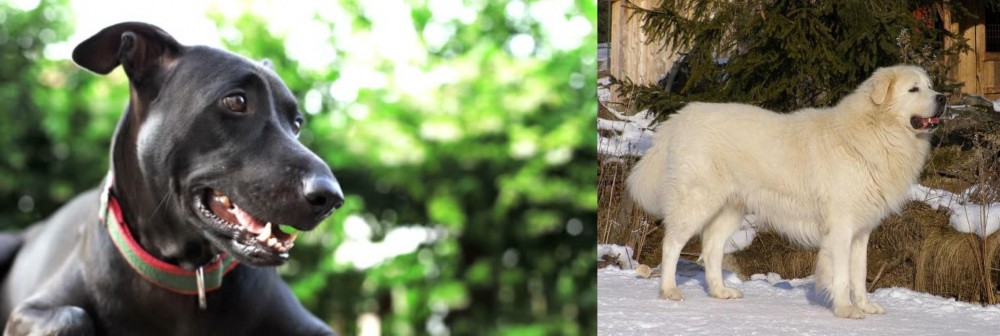 Shepard Labrador is originated from United States but Slovak Cuvac is originated from Slovakia. Shepard Labrador may grow 8 cm / 3 inches shorter than Slovak Cuvac. Shepard Labrador may weigh 8 kg / 17 pounds lesser than Slovak Cuvac. Both Shepard Labrador and Slovak Cuvac has same life span. Both Shepard Labrador and Slovak Cuvac has almost same litter size. Shepard Labrador requires Low Maintenance. But Slovak Cuvac requires Moderate Maintenance
Shepard Labrador is originated from United States but Slovak Cuvac is originated from Slovakia. Shepard Labrador may grow 8 cm / 3 inches shorter than Slovak Cuvac. Shepard Labrador may weigh 8 kg / 17 pounds lesser than Slovak Cuvac. Both Shepard Labrador and Slovak Cuvac has same life span. Both Shepard Labrador and Slovak Cuvac has almost same litter size. Shepard Labrador requires Low Maintenance. But Slovak Cuvac requires Moderate Maintenance
 The Labrador/German Shepherd mix, known as the Shepard Labrador was no doubt first bred in the United States from two very popular dog breeds - the Labrador and the German Shepherd.
The Labrador/German Shepherd mix, known as the Shepard Labrador was no doubt first bred in the United States from two very popular dog breeds - the Labrador and the German Shepherd.
Breeders of this dog were looking to bring about a dog that could be an exceptional companion with characteristics from both breeds.
Also referred to as the Sheprador, the dog will surely have an amazing temperament.
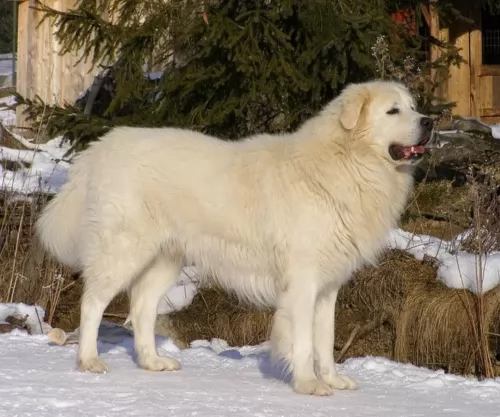 Looking quite a bit like the Pyrenean Mountain Dog, the Slovak Cuvac is a large dog that has served as a guard dog. The Slovensky Cuvac is still used on sheep farms as he isn’t afraid of wolves and bears and will take them on if needs be.
Looking quite a bit like the Pyrenean Mountain Dog, the Slovak Cuvac is a large dog that has served as a guard dog. The Slovensky Cuvac is still used on sheep farms as he isn’t afraid of wolves and bears and will take them on if needs be.
Records of this dog have been kept since the 17th century already, and when the breed started dying out, a certain Dr Antonin Hruza put in efforts to revive the dog.
The registered breeding of the Slovensky Cuvac was established in Czechoslovakia and a club for the dog was established in 1933. A written standard was established in 1964. The dog is not recognized by the Fédération Cynologique Internationale.
 With the Shepard Labrador, because the puppies come from two pure breeds – the Labrador and the German Shepherd, there is no really knowing how your pet will turn out. There is therefore no standard appearance.
With the Shepard Labrador, because the puppies come from two pure breeds – the Labrador and the German Shepherd, there is no really knowing how your pet will turn out. There is therefore no standard appearance.
Some will have floppy ears like the Labrador, some erect ears like the German Shepherd. The tail will always be long. The coat will always be thick and be short to medium in length. Some puppies will be born with a fawn shade and others will have the dark colors of the German Shepherd. Some will have a mix of colors.
They will be fairly large dogs standing at between 53 and 62m in height and weighing between 23 and 36kg.
Between two such splendid dog breeds, you’re guaranteed to get a wonderful temperament – after all, that's why the two breeds were brought together. Your Shepard Labrador will be friendly, playful, social,smart, courageous, loving, loyal and energetic, just loving to be around his human family.
These dogs get on well with children, and with training and socialization will get on well with other pets in the home. This dog really makes a splendid family pet.
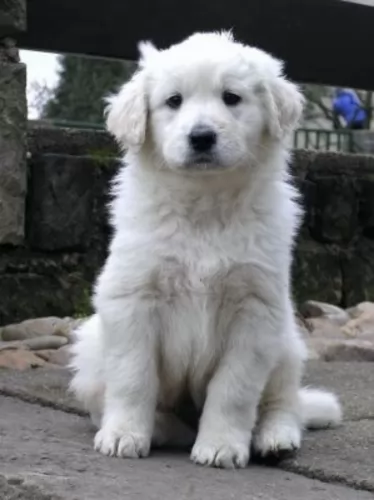 This is a large dog standing at between 59 and 70cm in height and weighing between 31 and 44kg.
This is a large dog standing at between 59 and 70cm in height and weighing between 31 and 44kg.
The neck is broad and has quite a bit of fur around it. The head is large, the eyes dark brown, the double coat is white and thick and medium length. The eyes are brown, the ears medium length and floppy and the tail long and furry.
This is a robust dog, used to spending time outdoors keeping watch over livestock. When he is invited into the home, he is gentle and well behaved, more so when he has been trained and socialized.
He is loving and loyal towards his human family and will get on well with children in the home. He isn’t the brightest dog but you can still have him trained.
 There are studies that show that dogs provide us with so many good things – companionship, comfort and relaxation.They provide us with entertainment too because some of them are so amusing with their antics.
There are studies that show that dogs provide us with so many good things – companionship, comfort and relaxation.They provide us with entertainment too because some of them are so amusing with their antics.
The Shepard Labrador is like that – he is social, friendly, loving and devoted and by bringing him into your home, you’re signing up for 10 – 14 years of sheer pleasure, less stress and superb companionship.
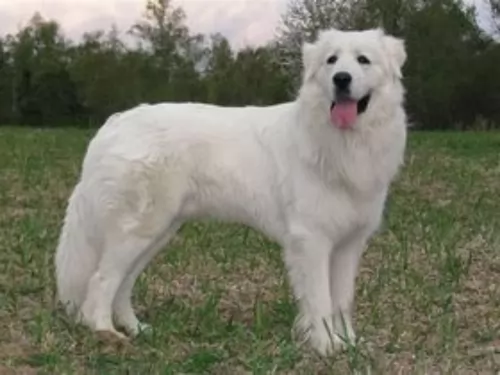 Your playful Slovak Cuvac is an affectionate dog, wanting nothing more than to be totally involved in his family’s life.
Your playful Slovak Cuvac is an affectionate dog, wanting nothing more than to be totally involved in his family’s life.
He is social and loving and also makes an excellent watchdog. He’s a big dog so think carefully before you bring him into your home. Many dog owners like the look of a big dog and forget that it costs a lot of money to feed a big dog and to pay for vet fees.
This big dog is wanting to be part of your family and not just to be discarded when you find that he is costing you too much.
 The Shepard Labrador is a healthy dog breed, and with the right nutrition and exercise can reach 10 to 14 years of age. There are always going to be those common dog illnesses that many dogs succumb to. Some of them are hip dysplasia, cancer, skin problems and parasites.
The Shepard Labrador is a healthy dog breed, and with the right nutrition and exercise can reach 10 to 14 years of age. There are always going to be those common dog illnesses that many dogs succumb to. Some of them are hip dysplasia, cancer, skin problems and parasites.
Hip dysplasia is a condition where parts of the hip joints don’t fit properly together. This creates a situation where there is abnormal wear and tear on the joints. It can lead to arthritis even and pain for your dog.
The tapeworm is a parasite spread to dogs but also to people, and it is through the ingestion of infected fleas. You can often detect this when you discover parts of the worm crawling in your dog’s bowel movements or they can be around the anus. You can suspect this when you see your pet losing weight and having diarrhea. Speak to your vet about how to control fleas with your dog.
This is a fatal disease where dogs are infected through bites from rabid animals. You’ll notice horrible behavioral changes in your dog. Unfortunately with this terrible disease, once symptoms appear, it is virtually too late for treatment.
 This is a healthy dog breed, but as with many large dogs, hip dysplasia is a threat. Hip dysplasia is always reason for concern as the condition can reduce a dog’s quality of life.
This is a healthy dog breed, but as with many large dogs, hip dysplasia is a threat. Hip dysplasia is always reason for concern as the condition can reduce a dog’s quality of life.
It is distressing seeing your once active pet becoming reluctant to play and move around.
Canine hip dysplasia is a common skeletal condition. It can strike any size dog but is more prevalent with large dogs. The ball and socket of the hip doesn’t fit properly and deterioration sets in resulting in loss of function of the joint.
You will need to get your dog to the vet who will perform a physical exam and discuss treatments to alleviate the pain your dog can experience.
 ◆Brush the coat of your Shepard Labrador twice a week to rid the coat of loose hairs and to keep the coat shiny ad healthy. Many people add in the Omega 3/6 oils to the dog’s food to ensure a healthy skin and coat.
◆Brush the coat of your Shepard Labrador twice a week to rid the coat of loose hairs and to keep the coat shiny ad healthy. Many people add in the Omega 3/6 oils to the dog’s food to ensure a healthy skin and coat.
◆Check the ears and eyes for infection. Make sure there are no signs of redness and discharge.
◆Check the inside of your pet’s mouth He has no way of telling you that a rotten tooth in the mouth is causing hi tremendous pain and affecting the his health.
◆Provide your pet with a warm, dry place to sleep. Make sure if he is outdoors that he has both sun and shade.
◆Feed your pet the best food there is. Your Shepard Labrador will no doubt be served commercially manufactured food. There are good and bad varieties. Make sure it is one of the better brands to ensure you don’t end up feeding your pet foods packed full of unhealthy ingredients such as colorants, preservative and fillers.
Try and include some home-made food to the diet. Boiled chicken, brown rice or pasta and spinach, sweet potatoes and carrots are a healthy choice for your pet as it won’t upset your dog’s digestive system.
Also try and include some raw meat into the diet as this can help in fighting off skin problems. Ensure your Shepard Labrador always has access to a bowl of fresh, cool water.
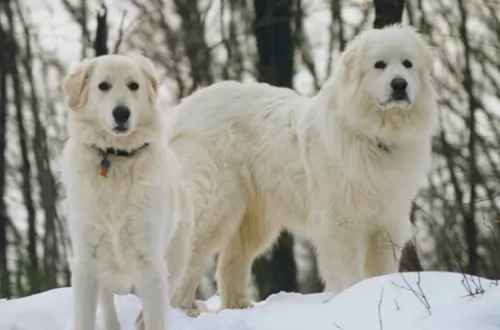 ◆The thick white hair will require regular grooming to keep it free from burrs and dirt. He sheds so this brushing will help him to look more groomed.
◆The thick white hair will require regular grooming to keep it free from burrs and dirt. He sheds so this brushing will help him to look more groomed.
◆The nails should be trimmed regularly and the ears too should be checked for redness and infection. You’ll need to look inside his mouth too as a rotting tooth can cause havoc within his body. A rotten tooth can also cause him tremendous pain and he has no way of telling you this.
◆Have your pet spayed or neutered if you don’t want any puppies. This is better for your dog’s health in the long run too.
◆Your Slovak Cuvac is going to need a lot of exercise as they have always been used to roaming the mountains watching over livestock.
◆This is a big dog so if you buy commercially manufactured food, make sure its for large, energetic dogs. There are good commercially manufactured dog foods on the market – just make sure you buy the best one for your pet to enhance health and longevity.
Try and give him some home made food too. Healthy food which won’t jeopardise his digestion is boiled chicken, brown rice or pasta and spinach, sweet potatoes and carrots. These can all be chopped up and small portions mixed into the dry kibble twice a week as a treat.
Try and include some raw meat occasionally. Your dog will thank you for not giving him exotic people foods which can do lots of harm. Ensure there is always a bowl of fresh, cool water within his reach.